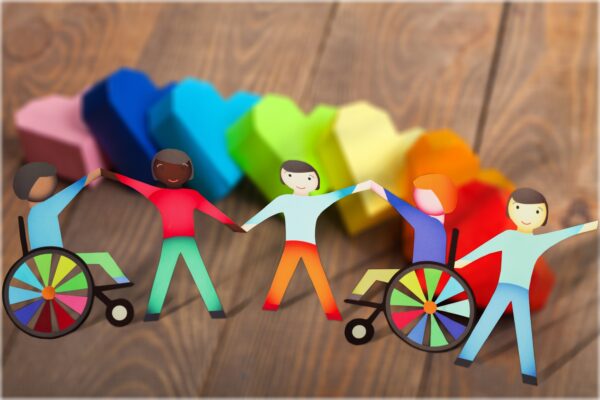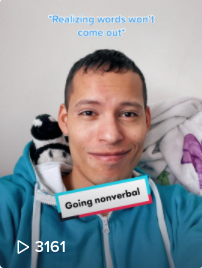A flower does not think of competing with the flower next to it. It just blooms.
Sensei Ogui, Zen Shin Talks
Lately I’ve been overhearing a lot of people talk about the “mental age” of their child with disabilities. “Liam is 9 but his mental age is 3.” “Kate is 20 but she’s functioning more on an 8 year old level.” It always irked me but I couldn’t put my finger on why until my own child was born with a disability and people started to talk about her the same way. “I’m not ready to label Avalon with autism yet but she clearly has a significant global developmental delay,” my daughter’s developmental pediatrician told me. “She’s a few months past her second birthday but she’s testing at the 9 month old level.” Some people reading this may think that I don’t want to own up to reality and the pediatrician is just doing her job and telling it like it is. It’s not a personal affront – it’s a statement of a scientific fact. Or is it? I accept my daughter’s disability and understand that it will have a significant impact on her life – I should know, I’m disabled too. What I don’t accept though, is calling her a different age than she really is.
Here’s why I think it’s time to retire the concept of mental age:
- They can hear you. Imagine being 30 and overhearing your mom or dad say “…but his mental age is really 5.” People with intellectual disabilities have told us that they don’t want to be referred to in this way. That’s really the only reason we should really need to stop doing it.
- It’s literally inaccurate. Someone who is 7 years old has 7 years of experiences and memories so their mental age cannot be 4. If they’re “mentally 4,” what about everything they did when they were 5, 6, and 7? Do those things not count? People, even typical people, learn things at quite varying rates. Some babies learn to walk at 8 months, others at 20 months. All are normal. Some children speak their first word early, and then another, and another. Others listen and observe and don’t begin speaking until age 3 but when they do, it’s in full sentences. Is this second type of learner “behind” or were they really just preparing to blossom? (Did you know that some species of flowers bloom every year whereas others take years, decades, or even centuries to bloom? Did anyone think to tell these slow-blooming flowers that they’re “behind”?!)
- It assumes a static position when in reality people are always learning. We may not always see people learning. It’s insidious. But it’s always happening, like the tide coming in. It sneaks up on you. One day your child cannot do something and the next day they suddenly seem to have mastered it. Children often have a “leap” or sudden burst of progress just when you least expect it. If you stare at a flowerbud hoping for change, you see absolutely no difference from one minute to the next. You start to think it will never bloom. Maybe it can’t bloom. It’s like trying to watch water boil. It always does, but seldom when you’re standing over it anxiously waiting, fist full of spaghetti noodles. In describing someone who is an adult with an intellectual disability as “mentally 12,” we assume they are stuck at their current skill level and that’s all they will ever achieve when that’s not actually true at all. Twelve year olds can learn things! And just imagine how many things someone who was 12 for 12 years could learn. But they’re not actually 12 for 12 years. They’re a 24 year old who has an intellectual disability. They may need help with certain things whereas they excel in other areas, but they will always have the capacity to learn more and achieve more. They are not an unbloomable bud. They are knee deep in their own process of blooming, even if you can’t see it because you’re expecting them to bloom the same way as a different flower does. Agave doesn’t bloom like bluebells. Peonies don’t bloom like poinsettias.
- It ignores the role society plays in disabling people by failing to provide understanding and accommodations for people with disabilities. Given the right platforms, assistive devices or technologies, people with disabilities often make huge strides that were once thought not possible and surprise the heck out of us. But we can’t focus on looking for how to help when we describe adults as mentally like a child and assume they’re incapable. I was struck by an example I saw on YouTube of a girl named Carly Fleischmann who is autistic and people assumed she wasn’t intelligent because she didn’t speak. But then when she was 11, she was given a keyboard and began to type and said things that proved that to be clearly wrong such as “I think people get a lot of their information from so-called experts. But if a horse is sick, you don’t ask a fish what’s wrong with the horse. You go right to the horse’s mouth.” And Carly is absolutely right! If we only listened more to people with disabilities rather than doctors, parents, and others who are charged with their care, we would have a much more accurate picture of who they are and what they can do (and how to teach them and accommodate them). It is society’s lack of ability to find ways to communicate with and understand people with disabilities that is disabling. Not that they are “mentally 12.” As Carly’s dad said “We were horrified because for years we had spoken in front of her as if she wasn’t there.” And after we gave her the keyboard “I stopped looking at her as a disabled person and started looking at her as a sassy, mischievous teenage girl.” There is nothing good that can come of assuming that someone isn’t able to learn. No one tells typical children “you can’t do it” and then wonders why they don’t succeed, but disabled children hear this message all the time. There are a lot more pre-keyboard Carlys.
- It’s often used to apologize for someone’s behavior when an apology or explanation isn’t really necessary. People with disabilities don’t need to apologize for taking up space. We exist. It’s okay that we exist. We’re different. It’s okay that we’re different. If your child is on the playground and they’re repeating words to themselves or spinning in circles rather than going down the slide, that’s fine. You don’t need to explain or apologize for your child’s disability to someone before they’ve even asked. In fact, it’s worse when done by a caregiver – someone who is supposed to be protecting and advocating for you, not perpetuating stereotypes and negative attitudes – (“You’ll have to excuse her, she does that BeCaUsE Of HeR aUtIsM.”) If you constantly hear people apologizing for the fact that you’re different, what message does that send exactly? A random stranger at the park is no more owed an explanation for why your child is repeating words than they are for why a typical kid is going up the slide instead of down. Or has chosen to balance on the wood at the perimeter of the playground rather than play on the play structures. All people behave differently. We are strange and wonderful creatures. Being quirky or creative is not something to apologize for or ablesplain. “She’s 4 but she acts like a 2 year old, that’s why she is playing that way” isn’t really accurate nor is it necessary. Some 4 year olds like to read books. Some like to play in the dirt and throw wood chips. Not everything someone does is because of their disability and even if it were, we don’t need to go around announcing it to everyone everywhere we go as if it were as quotidien as “good morning.”
- It contributes to infantilization of people with intellectual and developmental disabilities. People with disabilities are often treated as younger than they really are or subjected to people making incorrect assumptions about their abilities. Someone who has cerebral palsy and is of average to above average intelligence, for example, has likely experienced people talking slowly and deliberately to them, assuming that because they have a physical disability, they must have a mental one too. “Shouting: HELLO young man! What is YOUR name?” “Reply: Hi ma’am, I’m on my way to teach a physics class so I don’t have time to engage with you but have a nice day, okay?” People with disabilities and especially DD/ID are already talked down to and talked over enough. We don’t need to give people another reason to do so. “Well she’s mentally three so it’s okay to treat her like a three year old.” No.
- It fosters misconceptions about learning and human development that create meaningful harms against people with disabilities. As I mentioned earlier, everyone learns at different rates and has different learning styles. While we typically blame the individual (“Trina is ‘behind’ in math”), in reality it’s often society’s ineptitude at teaching people who learn or think differently that is the real problem. It might be more accurate to say that Springside Elementary is “behind” in their ability to teach math to Trina. Just because we can’t yet teach disabled people math at the same rate as we teach abled people, doesn’t mean the disabled people are not the age that they are! We cannot talk about someone’s mental age as if there are a set list of things people always accomplish by certain ages because that, in and of itself, is an incorrect and ableist concept. It ignores the fact that learning is not always linear and that doing things creatively has a value too. For example, think about a baby (disabled or not) who learned to bum scoot rather than crawling or walking. This child may be marked down as “delayed” since they haven’t achieved typical milestones like crawling and walking when in reality, they were able to travel around of their own volition sooner than the other kids. Doing something in a different way can sometimes be an advantage. When we teach children that there’s only one correct answer or only one path to follow, we do everyone — both the child themselves and society as a whole who could benefit from their creativity — a huge disservice.
- It’s looking at people’s deficits without considering their strengths. It’s a form of ableism to focus solely or more strongly on the things a person can’t do. We don’t point out everywhere we go that a person with a wheelchair can’t walk. Imagine saying “Oh Hi Jim in a wheelchair who can’t walk, how are you?” “Oh look, there goes Jim in a wheelchair who can’t walk!” At the grocery checkout “Okay Jim in a wheelchair who can’t walk, that’ll be $50.99.” I imagine someone would feel insecure, singled out etc. if that was happening to them daily everywhere they went. Jim works, he’s a son, a father, a member of the local chess club and he plays the violin beautifully. Him being in a wheelchair is part of him but not one that needs to be disproportionately pointed out everywhere he goes. Yet this is the experience of people with intellectual and developmental disabilities. “Oh don’t mind her, she has autism.” “He won’t hurt you, he just yells like that sometimes.” “She can’t understand you honey, she has a disability.” Or worse, “she’s not all there.” “He doesn’t talk” is also something to avoid because people assume that someone who does not talk can’t communicate when it would be better to say that the person “uses sign language” or “is an AAC user,” again – emphasizing what they CAN do rather than pointing out only what they can’t. If you look at the strengths of a person described as “mentally 12” or “mentally 3,” I think you’ll find that there are several areas where their skill level surpasses that age entirely. Or, just as with Carly, you may not understand what they understand but that doesn’t mean they are mentally 3.
- It’s a bandaid solution that replaces actually addressing the problem of creating inclusive and positive language to speak about people with disabilities. People are so much more complex than the concept of mental age makes them out to be. Let’s not take the easy way out, looking for a quick way to explain away someone’s behavior when it is different. One person with an intellectual disability might be able to manage money and balance a checkbook but they need help with social skills. Another might be a social butterfly but need help remembering to take medications and pay bills. So say that. They don’t “have the emotional maturity of a toddler,” they’re working on self regulation. They aren’t “like a 5 year old in traffic,” they’re a 42 year old adult who needs assistance with personal safety. Explain behaviors only when needed in a given situation and for the benefit of the disabled person themselves. Never reveal someone’s disability as an excuse or apology or for your own benefit, so you don’t have to do the real work of understanding and appreciating who they are as an individual. If it doesn’t sound helpful or kind if you were to use it to describe yourself, then don’t use that same language to talk about your disabled child, friend, or student. Those of us who support, love, and interface with people with DD/ID should be setting an example for everyone else as to how to talk about and interact with them, not perpetuating harmful stereotypes against them.
So why should we stop talking about mental age? Because as Carly said, it’s asking a fish what’s wrong with a horse. Because a flower getting ready to bloom is still a flower. An ocean before the tide comes in is still an ocean. In fact, at low tide, the ocean is full of energy and potential. And if you look hard enough, you just might find beautiful things. So I choose to look at my daughter not as an unblossomed flower, but as a rare, unique flower that is ever in the process of blooming on her own terms. She doesn’t care about how fast the other flowers are blooming. She isn’t “behind” anyone else. She’s on her own journey and she’s exactly where she needs to be. She’s not “mentally 9 months,” she is 2 years, four months, 28 days, 15 hours, 27 minutes and 42 seconds. Just like you and I, she’s constantly absorbing information from her environment, learning, growing and changing. Even when it looks like nothing’s happening, changes are brewing beneath her surface and her pot is getting ready to boil over. And one day when we least expect it, she too will send her blossom out, stretching upwards towards the sun.





